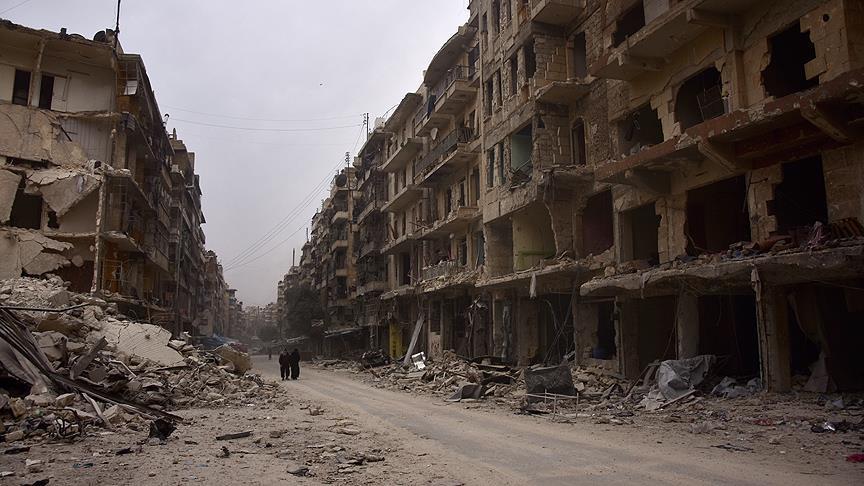Anadolu Agency
The continuation of the inter-Arab political crisis could contribute to Syria’s eventual division and the expansion of Iranian influence in Syria and the region in general, Osama al-Rifaei, head of the Syrian Islamic Council, said.
On June 5, five Arab countries -- Saudi Arabia, Egypt, the United Arab Emirates, Bahrain and Yemen -- cut off ties with Qatar, accusing it of supporting terrorism.
Doha, for its part, denies the allegations, calling the moves to diplomatically isolate it “unjustified”.
In exclusive comments to Anadolu Agency, al-Rifaei described the ongoing crisis in relations as “a return to Jahiliyyah [a pre-Islamic state of “ignorance”] and will affect the situation in Syria”.
“Those most negatively affected by the ongoing dispute [between Arab states] are the Syrian people,” he said.
He warned that Iran, one of the Bashar al-Assad regime’s main supporters, was “trying to promote the Shia doctrine” in the region.
“The Iranians are exploiting religion to reach their goals,” al-Rifaei said. “They don’t care about Shias, Sunnis or Islam; they’re fanatical nationalists.”
“If the brotherly countries of the Gulf remain locked in dispute, this will allow Iran to expand its influence and establish a foothold in the Gulf,” he asserted.
“This would not only harm us [i.e., Syrians], but the entire region,” he warned. “No one will benefit from this but the West.”
Carving up Syria
On suspected plans being hatched to carve up war-torn Syria, al-Rifai said “efforts in this regard are unremitting and clear”.
“Those playing a role in the international arena will be the beneficiaries of such an outcome,” he asserted. “They are linked to Western countries and have an interest in seeing the division of Syria.”
“The Syrian people, including the Kurds, don’t want to see the country carved up,” he added. “We [the Syrian people] have lived with each other for decades; we understand each other.”
“It is the West that is trying to divide us,” al-Rifaei said. “That there are forces actively promoting the break-up of Syria is a reality that we cannot deny.”
“We pray to God that our brothers in the Gulf will respond to our appeals to end the dispute with a view to averting a disastrous outcome,” he added.
“If something bad happens in the Gulf, this will have an impact on the issue of the planned break-up of Syria -- and could even accelerate it,” al-Rifaei warned.
The Syrian leader blamed U.S. President Donald Trump for spoiling relations between Gulf countries.
Trump “came to Saudi Arabia last month and corrupted their relations," he said.
On the impact of the current Gulf crisis on the Syrian conflict, al-Rifaei said Qatar has been a main backer of the Syrian revolution.
"Turkey and Qatar have faithfully stood by the revolution. The others were selling us words more that helping us," he said.
"If the fire ignites, it will catch everyone," he warned.
Turkish position
Al-Rifaei reiterated support for the Turkish efforts to resolve the Gulf crisis.
"We stand with the Turkish view that they are brothers and that they must maintain the meaning of brotherhood and not besiege or hurt each other," he said.
"Turkey does not side with any side," he said, describing the Turkish position as "moderate and balanced".
"The brothers in the Gulf should listen to advice from honest parties such as the Turkish government and other parties who appeal to them to heal their rift," al-Rifaei said.
The Syrian leader went on to warn that "while the Gulf crisis unfolds, the suffering persists in Syria".
Syria has been locked in a devastating conflict since early 2011, when the Assad regime cracked down on pro-democracy protests with unexpected ferocity, triggering a civil war that killed hundreds of thousands and displaced millions.
In May, Russia, Turkey and Iran agreed in the Kazakh capital, Astana, to establish "de-escalation zones" in war-torn Syria.
According to the agreement, the zones would cover the city of Idlib and certain parts of Latakia, Homs, Aleppo and Hama as well as Damascus, Eastern Ghouta, Daraa and Quneitra.
Established in Istanbul in April 2014, the Syrian Islamic Council includes some 40 Islamic groups in Syria.

